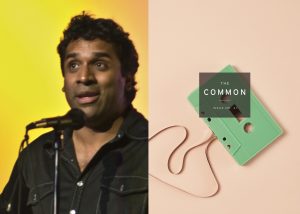A conversation between ILAN STAVANS and HAORAN TONG
Does a poet benefit from knowing more than one language? In what way do translingual poets approach their craft differently than their monolingual counterparts? Should translingual poets be understood as “self-translators”? Is translingualism a form of rebellion? How do we make home in, across, and between languages?
These topics are part of the following conversation between Ilan Stavans and Haoran Tong. Ilan Stavans is Lewis-Sebring Professor of Humanities, Latin America and Latino Culture at Amherst College. He is the author of the award-winning, book-length poem The Wall (2018) and the translator into English of Jorge Luis Borges and Pablo Neruda and into Spanish of Emily Dickinson and Elizabeth Bishop, among others. Chinese poet Haoran Tong is a student at Amherst College. The conversation took place electronically in Amherst and Wellfleet, Massachusetts, from June 25 to July 10, 2021.




 “Places remember what people forget.”
“Places remember what people forget.”









